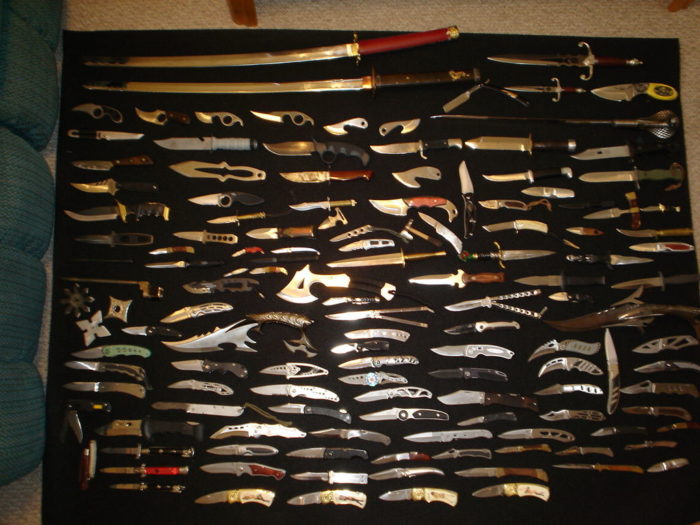Keeping the Edge Sharp
Last week marked the third anniversary of the small press that has released my last three books, The Crossover Alliance. In fact, my disaster thriller Beast was the first book released under its name. The motto of TCA is “A Different Kind of Fiction,” and their mission has been to put out Christian fiction that most publishers would consider too edgy, especially for the Christian market. TCA isn’t the first press to venture into these waters but it’s the first to go all in without leaning on side imprints for market stability or broader audience reach.
 While I’d love to toot my publisher’s horn, I want to focus on this nebulous term “edgy Christian fiction” and what it means today compared to what it meant just a few years ago. When one hears the term “edgy,” it usually means “hip” or “cool” or “trendy.” People often correlate “edgy” with “cutting edge,” the latest, most fashionable thing in this or that industry.
While I’d love to toot my publisher’s horn, I want to focus on this nebulous term “edgy Christian fiction” and what it means today compared to what it meant just a few years ago. When one hears the term “edgy,” it usually means “hip” or “cool” or “trendy.” People often correlate “edgy” with “cutting edge,” the latest, most fashionable thing in this or that industry.
But there is another meaning of “edgy,” one which applies more to creative people and their endeavors. When a book or movie or piece of art is labeled “edgy,” it means something that is on the edge of social acceptability, something far outside the mainstream so as to be on the edge of what people will digest. The word “edgy” is not a friendly word. After all, what has edges? Knives, scalpels, axes. The sharper the edge, the better the cutting tool. Something “edgy” divides and separates into those who dig it and those who don’t. It’s challenging and often uncomfortable, rewarding for some and repulsive to others.
Mainstream Christian fiction is usually the picture perfect example of a safe product. Yes, there are turbulent emotions and conflicts and struggles, but in terms of unsavory content, you’ll be hard pressed to find a “Gosh darn it!” This sort of writing characterizes the vast majority of Christian fiction and the publishers are very careful to maintain their sanitary image, lest their readers cry foul. This overemphasis on cleanliness makes it an easy target for mockery and derision by those of us on the edge. Sometimes the jabs are deserved, other times not. There is a wide spectrum of reasons why but the whole scenario can be likened to an unknown punk rock band grumbling about playing to empty bars while the sellout mainstream rock band that totally sucks plays to packed arenas. But hey, at least the punk rock band is staying true to themselves and playing from their heart, rather than what a boardroom of corporate suits tells them to play to get on the radio.

The Crossover Alliance
While edgy Christian fiction rarely appears on the bookshelves of the local Christian bookstore (though it is happening more and more), one can look at places like Realm Makers to see the popularity of stories that would be considered far too edgy for the Christian market just five or ten years ago. That’s not to say that the books at these events are bursting with swear words and nudity and sadistic gore, but they’re not windswept prairie romances either. So does this mean that “edgy” is losing its edge? I don’t think so. It means that more people are broadening their understanding of what Christian fiction can encompass.
There are many dangers, of course. Writers can include unsavory content for shock value. Readers can gravitate towards edgy books with a rebellious or sinful heart. Readers and writers can look down on “clean” books and chide them for being literary sissies. The drive toward edginess can overshadow the drive toward glorifying Christ. This is the most popular pitfall that many on the edge fall into. Any book by a Christian author, whether it is labeled as “Christian fiction” or not, should be judged by 1 Cor. 10:31: “Whether, then, you eat or drink or whatever you do, do all to the glory of God” (NASB). As Christian readers and writers, we are called not just to artistic excellence but most importantly to glorify God by what we read and write. Edgy for the sake of edginess is folly, especially if it leads readers’ imaginations into sin. But if God has impressed a story on our hearts that trudges through some mud into order to illuminate His truth, then we shouldn’t be scared of getting a little dirty.







































Hm, yeah. With edginess, whether it glorifies God or not probably has to do partly with the context of the edginess, what it’s trying to communicate, etc.
When I was younger I know I tried to make my stories a lot more sanitized than I do now. When I handled romance, for instance, I never wrote about people that cheated on their spouses or had sex outside marriage. That was partly because I was younger and probably had less interest in writing complex romantic subplots in the first place. But at that time, I probably saw that approach as more moral, too, or a way of modeling how people should behave. Everything I write is more complex now, though, so each of my characters currently has a different perspective on romance and sex and behaves accordingly. Technically the romance is still pretty clean, with no detailed sex scenes or anything. But there’s a lot implied from conversations chars have and the way they behave, so an adult would probably be able to understand what’s happening behind the scenes. Having stories be edgy from that standpoint tends to help the plot a lot, and for me at least it’s more glorifying to God that way.
At the very least it shows people how they could handle certain situations in real life, or why those situations happen in the first place. God calls us to sexual morality, for instance, yet we are built in a way that makes that difficult. Many of my stories explore why that is. My version of demon and angel descendants, for instance, tend to have physical forms that are designed to be sexually moral in certain respects. That means their entire culture is vastly different than humanity’s, so when they interact with humans it’s practically like running a simulation to see the pros and cons of human culture vs a culture that is instinctively moral on certain fronts.
Some of the answers from that ‘simulation’ have been pretty interesting, and in many cases show why God’s design for us is actually best, even if we struggle to meet his expectations sometimes. That is important to write about, because a lot of people question why God would allow us to be built in a way that tempts us to break his rules. So we sometimes need to write in an edgy way to answer important theological questions like that.
Thanks Mark. I knew my latest novella, “Jesus Loves Pornstars” had a purpose, though I’ve questioned myself persistently about how to tell the story in the most effective way possible. I think we’re being naive if we treat readers too gently, wearing kid gloves, and pretending the world isn’t the way it is. It doesn’t need to be gratuitous; it needs to be with a clear purpose. I want to read a satisfying character arc that goes extreme to extreme. This was a great counterpoint to the Altered Carbon discussion.